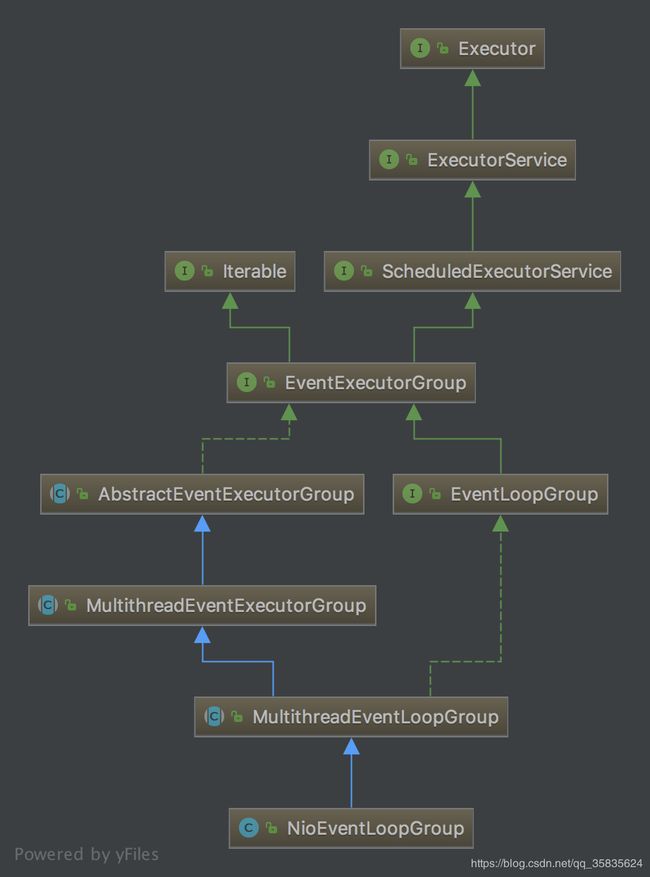netty NioEventLoopGroup的类图分析
NioEventLoopGroup的类图如下:
各接口功能说明
Executor接口:任务执行器
ExecutorService接口:提供了异步执行任务能力的执行器
ScheduledExecutorService接口:提供了执行定时任务的能力
EventExecutorGroup接口:ExecutorService的分组接口
AbstractEventExecutorGroup:EventExecutorGroup接口的抽象实现类
MultithreadEventExecutorGroup:基于多线程的 EventExecutor 的分组抽象类
EventLoopGroup接口:提供注册通道的能力
MultithreadEventLoopGroup:实现 EventLoopGroup 接口,继承 MultithreadEventExecutorGroup 抽象类,基于多线程的 EventLoop 的分组抽象类
NioEventLoopGroup:继承 MultithreadEventLoopGroup 抽象类,NioEventLoop 的分组实现类
各接口(或类)API源码简要分析(构造函数)
Executor接口
public interface Executor {
//执行command任务
void execute(Runnable command);
}
ExecutorService接口
public interface ExecutorService extends Executor {
void shutdown();
List<Runnable> shutdownNow();
boolean isShutdown();
boolean isTerminated();
boolean awaitTermination(long timeout, TimeUnit unit)
throws InterruptedException;
<T> Future<T> submit(Callable<T> task);
<T> Future<T> submit(Runnable task, T result);
Future<?> submit(Runnable task);
<T> List<Future<T>> invokeAll(Collection<? extends Callable<T>> tasks)
throws InterruptedException;
<T> List<Future<T>> invokeAll(Collection<? extends Callable<T>> tasks,
long timeout, TimeUnit unit)
throws InterruptedException;
<T> T invokeAny(Collection<? extends Callable<T>> tasks)
throws InterruptedException, ExecutionException;
<T> T invokeAny(Collection<? extends Callable<T>> tasks,
long timeout, TimeUnit unit)
throws InterruptedException, ExecutionException, TimeoutException;
}
ScheduledExecutorService接口
public interface ScheduledExecutorService extends ExecutorService {
public ScheduledFuture<?> schedule(Runnable command,
long delay, TimeUnit unit);
public <V> ScheduledFuture<V> schedule(Callable<V> callable,
long delay, TimeUnit unit);
public ScheduledFuture<?> scheduleAtFixedRate(Runnable command,
long initialDelay,
long period,
TimeUnit unit);
public ScheduledFuture<?> scheduleWithFixedDelay(Runnable command,
long initialDelay,
long delay,
TimeUnit unit);
}
EventExecutorGroup接口
public interface EventExecutorGroup extends ScheduledExecutorService, Iterable<EventExecutor> {
boolean isShuttingDown();
Future<?> shutdownGracefully();
Future<?> shutdownGracefully(long quietPeriod, long timeout, TimeUnit unit);
Future<?> terminationFuture();
@Override
@Deprecated
void shutdown();
@Override
@Deprecated
List<Runnable> shutdownNow();
EventExecutor next();
@Override
Iterator<EventExecutor> iterator();
@Override
Future<?> submit(Runnable task);
@Override
<T> Future<T> submit(Runnable task, T result);
@Override
<T> Future<T> submit(Callable<T> task);
@Override
ScheduledFuture<?> schedule(Runnable command, long delay, TimeUnit unit);
@Override
<V> ScheduledFuture<V> schedule(Callable<V> callable, long delay, TimeUnit unit);
@Override
ScheduledFuture<?> scheduleAtFixedRate(Runnable command, long initialDelay, long period, TimeUnit unit);
@Override
ScheduledFuture<?> scheduleWithFixedDelay(Runnable command, long initialDelay, long delay, TimeUnit unit);
}
EventLoopGroup接口
public interface EventLoopGroup extends EventExecutorGroup {
@Override
EventLoop next();
ChannelFuture register(Channel channel);
ChannelFuture register(ChannelPromise promise);
@Deprecated
ChannelFuture register(Channel channel, ChannelPromise promise);
}
AbstractEventExecutorGroup抽象类
submit: 提交一个方法到EventExecutor中,拿到一个Future(执行结果的占位符)
schedule:提交一个定时任务到EventExecutor中
execute:调用EventExecutor执行一个普通任务
public abstract class AbstractEventExecutorGroup implements EventExecutorGroup {
@Override
public Future<?> submit(Runnable task) {
return next().submit(task);
}
@Override
public <T> Future<T> submit(Runnable task, T result) {
return next().submit(task, result);
}
@Override
public <T> Future<T> submit(Callable<T> task) {
return next().submit(task);
}
@Override
public ScheduledFuture<?> schedule(Runnable command, long delay, TimeUnit unit) {
return next().schedule(command, delay, unit);
}
@Override
public <V> ScheduledFuture<V> schedule(Callable<V> callable, long delay, TimeUnit unit) {
return next().schedule(callable, delay, unit);
}
@Override
public ScheduledFuture<?> scheduleAtFixedRate(Runnable command, long initialDelay, long period, TimeUnit unit) {
return next().scheduleAtFixedRate(command, initialDelay, period, unit);
}
@Override
public ScheduledFuture<?> scheduleWithFixedDelay(Runnable command, long initialDelay, long delay, TimeUnit unit) {
return next().scheduleWithFixedDelay(command, initialDelay, delay, unit);
}
@Override
public Future<?> shutdownGracefully() {
return shutdownGracefully(DEFAULT_SHUTDOWN_QUIET_PERIOD, DEFAULT_SHUTDOWN_TIMEOUT, TimeUnit.SECONDS);
}
@Override
@Deprecated
public abstract void shutdown();
@Override
@Deprecated
public List<Runnable> shutdownNow() {
shutdown();
return Collections.emptyList();
}
@Override
public <T> List<java.util.concurrent.Future<T>> invokeAll(Collection<? extends Callable<T>> tasks)
throws InterruptedException {
return next().invokeAll(tasks);
}
@Override
public <T> List<java.util.concurrent.Future<T>> invokeAll(
Collection<? extends Callable<T>> tasks, long timeout, TimeUnit unit) throws InterruptedException {
return next().invokeAll(tasks, timeout, unit);
}
@Override
public <T> T invokeAny(Collection<? extends Callable<T>> tasks) throws InterruptedException, ExecutionException {
return next().invokeAny(tasks);
}
@Override
public <T> T invokeAny(Collection<? extends Callable<T>> tasks, long timeout, TimeUnit unit)
throws InterruptedException, ExecutionException, TimeoutException {
return next().invokeAny(tasks, timeout, unit);
}
@Override
public void execute(Runnable command) {
next().execute(command);
}
}
MultithreadEventExecutorGroup
成员属性:
//EventExecutor数组
private final EventExecutor[] children;
//只读的EventExecutor集合
private final Set<EventExecutor> readonlyChildren;
//已终止的 EventExecutor 数量
private final AtomicInteger terminatedChildren = new AtomicInteger();
//用于终止 EventExecutor 的异步 Future
private final Promise<?> terminationFuture = new DefaultPromise(GlobalEventExecutor.INSTANCE);
//EventExecutor 选择器
private final EventExecutorChooserFactory.EventExecutorChooser chooser;
构造方法:
//如果threadFactory为空,则创建一个单线程的线程执行器,并调用重载的构造方法
protected MultithreadEventExecutorGroup(int nThreads, ThreadFactory threadFactory, Object... args){
this(nThreads, threadFactory == null ? null : new ThreadPerTaskExecutor(threadFactory), args);
}
protected MultithreadEventExecutorGroup(int nThreads, Executor executor, Object... args) {
// DefaultEventExecutorChooserFactory.INSTANCE默认的执行器选择器工厂
this(nThreads, executor, DefaultEventExecutorChooserFactory.INSTANCE, args);
}
/**
* 构造函数中主要的逻辑如下
*
* 1、创建一个线程任务执行器ThreadPerTaskExecutor
*
* 2、初始化任务执行器数组
*
* 3、创建EventExecutor选择器
*
**/
protected MultithreadEventExecutorGroup(int nThreads, Executor executor,
EventExecutorChooserFactory chooserFactory, Object... args) {
if (nThreads <= 0) { //合法性校验
throw new IllegalArgumentException(String.format("nThreads: %d (expected: > 0)", nThreads));
}
//如果线程执行器executor为null,则创建任务执行器
if (executor == null) {
executor = new ThreadPerTaskExecutor(newDefaultThreadFactory());
}
//创建事件执行器数组
children = new EventExecutor[nThreads];
for (int i = 0; i < nThreads; i++) {
boolean success = false;
try {
children[i] = newChild(executor, args);//初始化任务执行器
success = true;
} catch (Exception e) {
throw new IllegalStateException("failed to create a child event loop", e);
} finally {
if (!success) {
for (int j = 0; j < i; j ++) {
children[j].shutdownGracefully();
}
for (int j = 0; j < i; j ++) {
EventExecutor e = children[j];
try {
while (!e.isTerminated()) {
e.awaitTermination(Integer.MAX_VALUE, TimeUnit.SECONDS);
}
} catch (InterruptedException interrupted) {
// Let the caller handle the interruption.
Thread.currentThread().interrupt();
break;
}
}
}
}
}
//创建EventExecutor选择器
chooser = chooserFactory.newChooser(children);
//创建中止监听器
final FutureListener<Object> terminationListener = new FutureListener<Object>() {
@Override
public void operationComplete(Future<Object> future) throws Exception {
if (terminatedChildren.incrementAndGet() == children.length) {
terminationFuture.setSuccess(null);
}
}
};
//绑定监听器
for (EventExecutor e: children) {
e.terminationFuture().addListener(terminationListener);
}
Set<EventExecutor> childrenSet = new LinkedHashSet<EventExecutor>(children.length);
Collections.addAll(childrenSet, children);
readonlyChildren = Collections.unmodifiableSet(childrenSet);
}
MultithreadEventLoopGroup类
成员属性
//默认EventLoop数量,默认为CPU核数的2倍
private static final int DEFAULT_EVENT_LOOP_THREADS;
static {
DEFAULT_EVENT_LOOP_THREADS = Math.max(1, SystemPropertyUtil.getInt(
"io.netty.eventLoopThreads", NettyRuntime.availableProcessors() * 2));
if (logger.isDebugEnabled()) {
logger.debug("-Dio.netty.eventLoopThreads: {}", DEFAULT_EVENT_LOOP_THREADS);
}
}
构造方法
调用父类构造方法
protected MultithreadEventLoopGroup(int nThreads, Executor executor, Object... args) {
super(nThreads == 0 ? DEFAULT_EVENT_LOOP_THREADS : nThreads, executor, args);
}
protected MultithreadEventLoopGroup(int nThreads, ThreadFactory threadFactory, Object... args) {
super(nThreads == 0 ? DEFAULT_EVENT_LOOP_THREADS : nThreads, threadFactory, args);
}
protected MultithreadEventLoopGroup(int nThreads, Executor executor, EventExecutorChooserFactory chooserFactory,Object... args) {
super(nThreads == 0 ? DEFAULT_EVENT_LOOP_THREADS : nThreads, executor, chooserFactory, args); }
